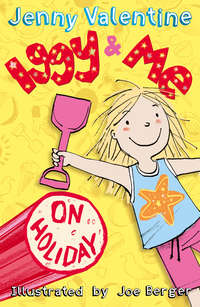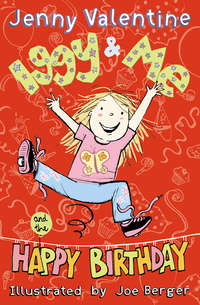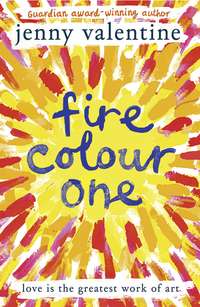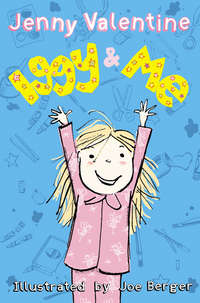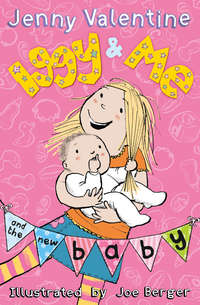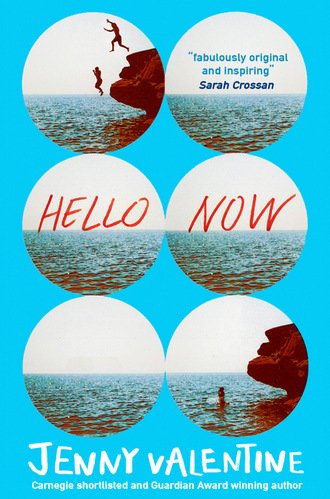
Полная версия
Hello Now
‘I hate this,’ I told her.
‘Me too,’ she said, and she tried to put her arm round me, mark the occasion like we were in it together, but I dodged out of range and left her hanging, because in that moment I felt like my eight-year-old self with that ball of string, and that feeling made me angry.
If we were back there, arriving at Henry’s again, if it was happening now, I would do so much better than that. I would remember that sometimes, the thing you’ve dreaded the most can be the actual making of you, the thing you would never end up trading for all the money or fame or love or good fortune in the world. I would take my old self to one side and tell them straight out that one of the best things about the unknown is that it’s 100 per cent guaranteed to surprise you. Every time.
***
6
MUM RANG THE BELL AND KNOCKED ON THE front door, even though we had our own key. She said it was the right thing to do, but when Henry Lake didn’t answer, she gave up on the right thing pretty quickly and we let ourselves in. Her favourite mug has a Groucho Marx quote on it: These are my principles, and if you don’t like them … well, I have others. I shoplifted it for her one Christmas (using the principle of common ownership) and she has no idea, but that’s a whole different can of worms. This can of worms was Henry Lake, who must have felt rather than heard the key in the lock and the mortise rolling open and us standing there underneath him in the empty hall, waiting for the next great big chapter in our lives to begin.
Inside, the house was quiet and full of echoes, kind of dank, like a cave. High ceilings and low lighting. Room after room, full of nothing. Dark, bad-weather-grey walls, old floorboards the colour of pricey honey. The hallway alone was bigger than the whole downstairs of our old flat. In a room at the back, a slice of window filled with nothing but the petrol-blue sea, churning and hypnotic, oddly silent behind the glass. Henry Lake came out of his room and stood over us at the top of the staircase, a man steeling himself to make any kind of entrance. If Mum was hoping for shining armour, she was disappointed. He was old like Methuselah and oddball perfect. Stooped over, kind of tall, apologetic almost, bone thin. His jeans hung from his hips like they were empty on a peg, like half of him had already given up and started disappearing. Sunglasses, even in that gloom, and a faded black baseball cap pulled down low as it would go over the bridge of his nose. Out of its shadow, the rest of his face was just grey beard. There was a rhythm to the way he took the stairs, a deliberate thump that bounced off the walls and made the light fixtures tremble. Over that, I could hear the music still playing in his ears, distant and tinny, a dropped box of pins on repeat, headphones the size of ear defenders over the top of his cap. He didn’t turn it down or take any of it off, just stood there in full disguise, insulated against our normal, whatever that was. There was no way of telling who he was under there. It occurred to me for a second that he might be wildly famous, because only a proper celebrity would meet someone for the first time and try to get away with a look as batshit as that.
‘You’re here,’ he said, and Mum said, ‘Yes.’
‘Good,’ he said. ‘Welcome. I’ve been waiting.’
Surrounded by all that sober wood, the dust thick and dancing in pockets of sunlight, Mum introduced me, and I scowled and waved like some dumb teenager from central casting, and Henry Lake smiled. At least I think he did. Something moved under that beard anyway. I could hear him chewing, the regular, elastic squelch of his gum, the pulse in his forehead going like a metronome. He made a break-ice comment about the weather, and it was obvious he’d rehearsed it, for something to say, and that he had nothing else to follow it with, nothing prepared. It’s a terrible thing when some people make small talk – like seeing a wild animal in a sweater. Mum said something back, something optimistic about the quality of the light, and when that died a death, we just stood there in silence and it was pure tumbleweed – pure, undiluted awkward. My hangover was a stealth one. The kind that wakes you up fine, lulls you into a false sense of security, and then waits till you’re fully immersed in your day before it decides to pin you down and kick you in the teeth. I wanted to go to my room and get into bed, but neither of those things existed any more, not in the same way, and that just made me want them even more.
Look at us in that Now. Mum and Henry Lake radiating strangeness and dashed hopes, trying to dredge up something to say to each other, and me with the sudden homesick cold sweats, malfunction-malfunction.
A bell rang upstairs somewhere, and Henry said, ‘Must go,’ and I was like, Where? as he bowed to both of us, shallow and quick, like a butler, and went back up the stairs. I heard his door open and shut and Mum closed her eyes and breathed out.
‘Well, that went well,’ she said, and I said, ‘Yeah. I don’t know what I’ve been worrying about all this time,’ and I went outside and sat on the doorstep, hoping someone from my old life would drive by and save me.
Across the road, an ambulance arrived, sirens off, no great hurry, and a nurse came out of the house opposite and stood on the doorstep in the swaying shade of a rose and ushered the paramedics in.
‘Mrs Midler,’ Henry said from his place at the window above me, leaning, elbows on the sill. ‘She’s the last of them.’
I looked up. ‘Last of who?’ I said.
The nurse shut the front door and Henry said, ‘The old guard. All new here now. All change,’ and he was already moving back in, already pulling on the sash window with his stick-thin arms, the skin on them rippled and half-see-through like a forgotten balloon.
Not long after that, the moving van rumbled up to meet our car nose to nose. ‘Mum,’ I said. ‘The Freak Brothers are here,’ and the men who’d stripped our flat like locusts the day before dropped on to the tarmac in their matching red T-shirts and caps, trailing fat clouds of indolence, fatter clouds of weed. They opened the back and it made this gunshot noise in the quiet street that ricocheted off the housefronts and upset the seagulls.
‘Welcome to our Family Museum,’ I told them as they wheeled and cawed in the blue, watching them unload our old life. ‘Roll up, roll up for a show of our worldly goods.’
Exhibits included one scrubbed table and four stained chairs. An old pavement-coloured meat cupboard and the top, non-business half of an old pinball machine. Our dented fridge, ink-black with mould in certain places and still stuck somehow with a sea of alphabet magnets that pooled together to spell jUDe!*?! and BY m0Re M1Lk FfS and then broke apart again into chaos. Two cheap flattened beds and Mum’s high-backed armchair, a plan chest, an invasion of bin bags (clothes, basically), boxes of books, and some stuff in bubble wrap – that one mirror, that one canvas, that one I couldn’t even remember any more. The men in red walked everything up the path, tendons straining, teeth gritted, and in through the stale, narrow mouth of our new front door. It wasn’t nearly enough to make a dent on a house that size. The things we owned sat marooned in each sea of room, washed up and adrift, just like wreckage. Just like us.
Out on the street, the movers climbed back into the van and slammed the doors, and after that the paramedics wheeled Mrs Midler out of the house opposite on a stretcher with the blanket pulled up over her head. Everything was dead quiet, apart from the blunt sound of her rattling down the front path and off the kerb. It took them three tries to get the ambulance doors shut, and the noise spun the gulls off the roofs, kick-started a dog-barking relay two streets away, woke up a couple of babies in their pushchairs somewhere, and life began again, just like that.
Henry Lake dropped something upstairs and it broke and he swore, and the scrape and rustle of him clearing it up above me was like a haunting. Less sitting tenant somehow, more housebound ghost. I wondered how long he had lived there, and what he’d meant, exactly, by the old guard, and how he felt about us just moving right in, and how many other people he’d watched come and go from his place in the middle of that house. The way of things, I know, the ebb and flow, but still, relentless.
***
7
LATER, MY ARMS WERE FULL AND I WAS TRYING to navigate the landing when I went backwards through the wrong door into Henry’s private territory. Two airless rooms divided by frosted-glass doors, the shapes of unmade bed and heaped-up chair on one side, and, when I turned, a skeletal chandelier listing from the ceiling, a table that looked like someone had emptied a filing cabinet and about a month’s worth of dishes on to it. A portrait of a dark-haired woman, just her naked back and her long neck, her face about to turn to show her profile, but just out of reach, and that forever-not-quite caught my attention. I looked at her for a long time. At the other end, a half-arsed kind of kitchen, an antique fridge the colour of old custard, and an angry, worn-out, straw-yellow budgerigar in a cage. Things that might have enjoyed some spread in the rest of the house were sardined into this one cramped, chaotic space. I had this sense of Henry and all his stuff gathered there, in the centre, the way the pupil of your eye retracts in bright light. Three huge wardrobes stood side by side, giants waiting for a bus. A sofa suffocated under piles of old maps and notebooks, no space left on it to sit, a lidless pen bleeding ink into its grubby cushions. Above that was the biggest map of the world I’ve ever seen, stuck with hundreds of tiny pins. The paintwork was a lumpy, tobacco-stain kind of white, and the floorboards were covered with newspaper and boot prints and bird shit. Something on the hob smelled like boiled chicken, rich and strong and kind of everywhere. I wondered how the caged bird felt about that. It stared at me, and so did Henry Lake. Two pairs of eyes. One quick-black bird-lacquer, the other, without sunglasses this time, mind-bendingly tired. I don’t think I’d ever seen anyone look more exhausted. I didn’t want to look at him for too long, in case it was catching.
‘Sorry,’ I said. ‘Wrong door,’ and the budgie twitched. Henry Lake smiled and wiped his hands on a stained tea towel. He moved to sweep half the contents of the sofa straight on to the floor. ‘No, come in. Excuse the mess. It’s been ages since I had a visitor.’
Out of politeness more than anything, I put the stuff I’d been carrying down by the door, setting off an epic cloudburst of dust, and I sat on the edge of the sofa while the little bird shivered in its cage and Henry searched for something in the kitchen.
‘Do you like olives?’ he said, not exactly hanging on an answer. ‘I’ve got a jar somewhere.’
‘I’m all right,’ I said.
‘Tea? Soup? I’m making soup.’
‘I don’t need anything. I’m fine.’
‘Hungry work, I’d have thought,’ he said, ‘moving.’
‘I’m used to it.’
‘Lucky you,’ he said, and I rolled my eyes.
‘If you say so.’
‘Are you furious?’ he asked me, and I wasn’t expecting that question, so I was honest. I didn’t have time to hide my answer behind anything, to cover it up.
‘Yeah,’ I said. ‘I am, sort of. I hate change.’
In the silence that followed he went back to poking at the keyboard of a clunky old laptop. The razor-clam fridge hummed. The bird fussed. My asthma was starting up, that wet wheeze like chunks of my breath being passed through a sieve. I’m allergic to dust. It makes my eyes burn and my nose run and my lungs block all the exits, and it is everywhere, I know, but that old house was the Mothership, the source of its Nile. I used my inhaler and concentrated on breathing, and I had another look around while Henry tapped away. The back wall was covered in clocks, different shapes and sizes, not one of them set to the same time. All that ticking sounded like rain dripping somewhere on a roof.
‘Change,’ Henry Lake said, ‘is unavoidable. Essential. It’s the engine of everything.’
‘I know,’ I said, because I hadn’t meant it at an atomic level, I’d just meant the my-mum, emotional-rebound kind of change.
‘Imagine life without it,’ he said. ‘A rock in a stream.’
‘Rocks change,’ I said. ‘The water changes them,’ and Henry smiled.
‘You’re a smart one, aren’t you? I can see we are going to be friends.’
‘Friends are a bit of a sore topic for me,’ I said.
‘It’ll pass,’ said Henry. ‘Life will provide.’
‘You reckon?’
‘I’m an unspeakably old man,’ he said.
‘So?’
‘So I’ve seen it enough times to know.’
‘I haven’t,’ I said.
‘But you will.’
It was quiet then, and I looked at the woman’s portrait again, the smooth skin of her back, her turning head.
‘I do like that painting,’ I said, and he smiled.
‘Lifetimes since I did that.’
‘You did it?’
‘I used to love to paint,’ he said. ‘A very long time ago. And then a very long time ago, I gave it up.’
Some tiny part of me believed the woman in the portrait might actually turn round. I remember thinking how silly that was, that I felt like that, even in that moment. ‘She’s very lovely.’
‘Yes.’ Henry frowned and carried on typing. ‘She was.’
He turned the laptop screen towards me, some kind of aerial view. Wild dust, scrubby trees, a shrunken river. A pack of dogs crossed the picture from bottom corner to top. Tall slanted shadows, left to right. ‘Look at this,’ he said. ‘Today, we’re on the savannah.’
‘Today?’
‘Yes. See?’ He got up and pointed to the giant wall map. ‘Sub-Saharan Africa. About here.’ He put a pin in it.
‘Have you been to all of those places?’ I said. ‘With all of those pins?’
The estate agent’s had called Henry Lake a recluse. They hadn’t mentioned anything about world travel.
‘In a manner of speaking,’ he said.
‘What manner?’
He didn’t answer me. Not directly. He said, ‘Have you ever seen these dogs in the wild?’
‘Me? Nope. Never been anywhere. Not like that. I don’t even know what kind of dogs they are.’
‘Well,’ he said, flourishing his hands like a magician at the end of a trick. ‘There. Painted dogs. You’ve seen them now.’
‘Yes, but we’re not in the wild, are we? We’re not actually there.’
Henry reached out a hand to touch the screen. ‘We work with what we have,’ he said. ‘There’s more than one way to see the world these days.’
‘Okay,’ I said. ‘If you say so.’
The look on his face was kind of pleading. He so wanted to be right. ‘This is really happening, Jude. Those dogs are moving across that ground right now. Right this minute. Look. Isn’t that something? Isn’t that good enough?’
He typed something into the filthy keyboard and the picture zoomed, close up, a dog moving on its haunches, ears turning like satellite dishes, mouth dripping chewed foam and a grin. I remember the stark strong shadows and the dogs’ tongues lolling, and I might have heard the ragged sounds of their breath. I can’t have felt the blunt heat of the air, the greasy nap of their fur. Still, my memory fills in those blanks for me anyway, and those dogs seem hyper-real now to me.
‘How does it work?’ I said. ‘Do you just shut your eyes and stick a pin in the wall?’
‘Something like that.’
‘Right.’
‘Modern technology. It’s a tremendous help for someone like me.’
‘Someone like you?’
‘I can’t get out,’ Henry Lake said.
‘What, ever?’
He shook his head. ‘It’s more trouble than it’s worth.’
‘Really?’
I wanted to know how he lived like that. Where did his food come from? What happened if he got sick? And I wanted to know why too, more than anything, but I’d only just met him, so I was nervous to ask. Mum started calling me from downstairs, fifth-gear annoyed with me already – something about a chest of drawers, something about my skateboard being a death trap, something else about me lifting a finger to help.
‘You’d better go,’ he said, and I picked up my boxes from where I’d left them by the door, and our conversation was over.
Henry hunched down closer at his table, a world traveller under house arrest, with his elbow in a plate of dried sauce, his gnarled, papery hand scratching at the roots of his beard. One foot in the savannah, the other trapped in the yolk of an egg.
***
8
I HELPED MUM DO A FEW THINGS, AND THEN I got away as soon as I could, on my own for the first time all day. Upstairs, my new room in the attic was a mixed bag, two parts brilliant, two parts the opposite of that. It was the place where all the flies came to die. I watched them flitting and buzzing at the windows like crowds at the turnstiles, leaving their weightless corpses across the sills and along the very edges of the floor. Henry Lake’s boiled-soup smell was strong up there too, but the space was massive, the whole width of that massive house. I’d never had so much space in my life. I explored a bit, poked around in its dark corners, tried to picture it all cleaned up and perfect, but the dust in there was threatening to kill me, so I took my book, made my exit, and climbed up through the skylight and down on to the flat roof below.
I was shielded by trees up there, kind of hidden, with a view of the street in front and the sea behind. I sat with my back against the wall. Warm bricks, salt breeze, sunshine. I took some pictures of the sky on my half-dead phone. Through the cracked screen it looked like someone had taken a hammer to the clouds. The sun was bleeding rainbows round their edges. Way above all the mess and the action, the world is forever a beautiful place. I read for a bit but my head was too crowded so I shut my eyes and let the light push through my eyelids, coral and warm. Henry’s open window offered up some weird record, grown men singing through their noses, moaning all together like ten types of wind trapped down a well. There was a cricket match playing on someone’s radio, the low bellow of the docks, the muted crash and roll of all that water, and above me, when I opened my eyes again and looked up, the long straight out-breath of a passing plane in the blue.
The breeze dropped. I looked down sideways over the edge of my roof to the floor below. The straw-yellow bird was dancing about on Henry’s window ledge, the gulls on next-door’s roof sizing it up, deciding just how and when to rip it to pieces and fight over the spoils. I waved my arms at them, international bird-speak for leave the little one alone, and they stood up, flapped and shifted, flinging their eyes at me like stones.
‘Parker?’ Henry said. ‘Charlie Parker, come inside at once,’ and it struck me, because the bird I’d always imagined Charlie Parker to be was something sleek and soaring like his music, not a fluffed-up, clapped-out old budgie in a cage. I wondered if this Charlie Parker was even a tiny bit tempted to risk it, take its chances with the big world, and just fly. But birds like that don’t survive in the wild. Not here anyway. Maybe it travelled like Henry Lake did, not for real, just in its own head. Henry’s hand came out then and the bird hopped straight on to the bowl of his crumpled, ancient palm, and there was my answer. The window rumbled shut and I thought, Oh well, we’re here now, let’s see what happens. I bet it’s nothing at all.
Just how wrong can a person be?
***
NOVO
YOU ARE THE PLACE I RETURN TO, IN between times. My fulcrum, the point at my centre, round which all of me turns. You are my chance at stillness. The rock in my water. I know you.
I wait for you to see me. I hope for it, that pin drop in my infinities. I know to hope, but not to be certain. It is never guaranteed.
I would show you all the magic there is if you asked me. I would bring you the universe on a plate, take you out from under the rules that apply, so that anything was possible. You could slip between layers of sky and count the atoms. You could reflect light like the moon. You could hear all the languages of the world, all their words and all the wordless ones too, and you would know them. You could fly in water and swim in air. You could spend a whole life’s worth of time in the moments it takes you to blink.
I would give you anything you asked for, in exchange for one of your looks.
***
Конец ознакомительного фрагмента.
Текст предоставлен ООО «ЛитРес».
Прочитайте эту книгу целиком, купив полную легальную версию на ЛитРес.
Безопасно оплатить книгу можно банковской картой Visa, MasterCard, Maestro, со счета мобильного телефона, с платежного терминала, в салоне МТС или Связной, через PayPal, WebMoney, Яндекс.Деньги, QIWI Кошелек, бонусными картами или другим удобным Вам способом.


